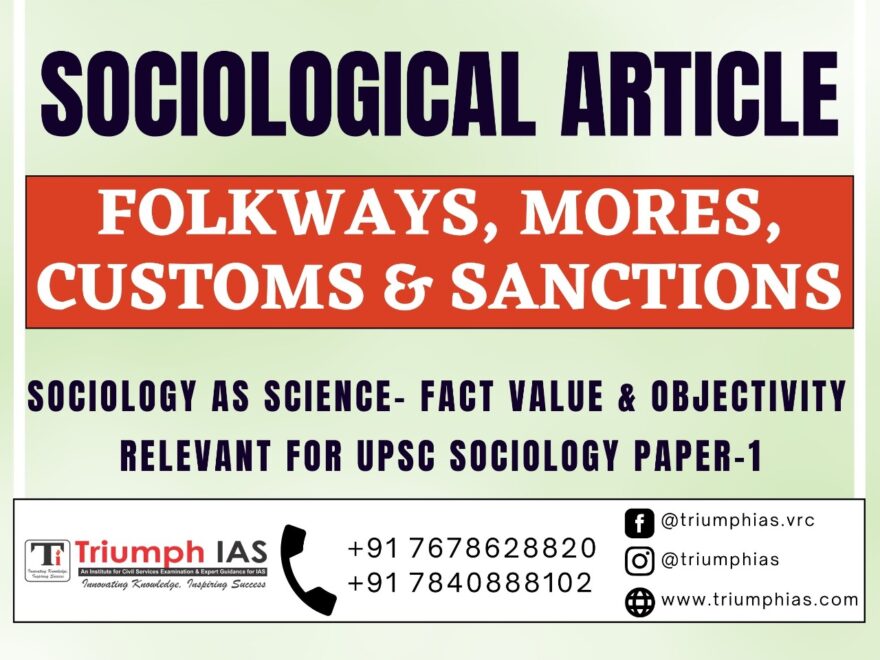FACT VALUE & OBJECTIVITY: FOLKWAYS, MORES, CUSTOMS, SANCTIONS
FOLKWAYS

Meaning and Definition
William Greham Sumner introduced the term ‘folkways’ in his classic work entitled ‘Folkways’ in 1906. The word literally means ‘the ways of the folk’. ‘Folk’ means people and ‘ways’ refers to their behavioural traits. Thus “folkways” are norms which we conform to because it is customary to do so. Folkways are accepted ways of behaviour. Human beings adapt to their environment with the help of folkways. The term broadly includes customs, conventions, usages, etiquettes etc. They are recognised ways of behaviour. They arise automatically within a group to meet the problems of social living. Social life is full of problems-how to make a living, how to dress, how to eat, how to speak and how to relate ourselves with others. Man seems to have tried every possible ways of dealing with such problems. Different societies have found different solutions. With respect to eating, a group may eat once or several times daily, they may eat while standing or sitting or walking, they may eat together or in private or they may eat with fingers or with forks, they may eat non-veg or simply reject it. Each trait is a selection from a number of possibilities. A group through trial and error method arrives at one of these possibilities and accepts it as the normal way of behaviour. It is then passed on to the next generation and hence becomes one of the ways of the group or of the folk and hence the folkways. Thus they are those unconscious collective modes of behaviour which ensure the survival of the group. They are the customs and usages which have been passed from generation to generation and to which new elements are added according to the changing needs of time. Man adapts to his surroundings through them. Members of a group hardly question a folkway and simply abide by then.
Definition
Gillian and Gillin: “Folkways are behaviour patterns of everyday life which generally arise unconsciously in a group.”
Horton and Hunt: “Folkways are simply the customary, normal, habitual ways of doing things.”
Mailver: “Folkways are the recognised or accepted ways of behaving in society.”
Merill Eldredge: “The folkways are literally the ways of the folk, i.e., social habits or group expectations that have arisen in the daily life of the group.”
A.W. Green: “Those ways of acting that are common to a society or a group and that are handed down from one generation to the next are known as folkways.”
Lundberg: “Folkways are the typical or habitual beliefs, attitudes and styles of conduct observed within a group or community.”
Characteristics of Folkways
A study of these definitions reveals the following characteristics of folkways:
(1) Spontaneous Origin: Folkways arise spontaneously, they are not deliberately planned. They develop through experience.
(2) Recognised Behavior: Folkways are the approved ways of behaviour. The group accords recognition to certain ways and reject others. Only those behaviours are folkways which are approved by the group.
(3) Distinctiveness: A wide range of folk ways are found in different societies. They become group specific and variations in the folkways are found between groups.
(4) Hereditary Folkways travel from one generation to another.
Varieties of Folkways
Folkways are infinite in number and range from most triffling matters to most serious ones. The Hindu Brahmins do not take meat. The Bengalis prefer rice to bread. The Jains do not take curd. Horse meat is eaten in Europe but not in America. Ants and insects are eaten by Indians in Brazil but not in Europe and America. Many people do not take a particular food because they do not like its colour or smell. Eating style is also important. Tamils take rice with hands while people in the North prefer to eat with spoon. The Brahmins take food in the kitchen and other castes may have their food outside. Folkways vary from culture to culture and within culture too. Variations according to age and sex are omni-present. Man’s smoking is a part of folkways and that by women and children are a violation of the folkways. Such variations of folkways are found with respect to marriage, death, sex, worship, birth, kinship, dress etc.
Sanctions of Folkways
The sanctions of the folkways are informal. Every violation of folkways is associated with some standardised procedure for punishment or discouraging the violation. Gossip and ridicule are used against violation of folkways. Repeated violation is taken seriously by the society. Informal sanctions are effective to group members only. For example, a city girl wearing jeans in a village may be criticised but she may not entertain the criticism and hence it may be ineffective.
MORES

Mores are regulators of human behaviour. They represent another category of norms. They denote behaviour patterns which are not only accepted but are prescribed. Sumner used the term “Mores” for those folkways which are indispensable for the group’s existence. The term “Mores” is derived from the Latin word “mos” which stands for customs. As customs cannot be violated by any individual, so Mores also cannot be violated and if violated it shall be followed by severe punishment. There is a great fear about violating a “mos”. Mores relates to more fundamental requirements of society more directly as compared to folkways. Mores are those felkways considered as regulators of behaviour and conformity of which is required and non-conformity calls for group coercion. They express the sentiments of the group as to what is fitting right and conductive to group welfare. They are the only right ways of acting and thinking. They are value-judgments regarding the folkways.
Definitions of Mores
Maclver: “When the folk ways have added to them conception of group welfare, standards of right and wrong, they are converted into Mores.”
Gillin and Gillin: “Mores are those customs and group routines which are thought by the members of the society to be necessary to the group’s continued existence.”
A.W. Green: “Common ways of acting which are more definitely regarded as right and proper than the folkways and which bring greater certainty and severity of punishment if violated, are the Mores.”
Functions of Mores
-MacIver and Page have enlisted the following functions of Mores.
(1) Mores determine much of our individual behaviour. Mores always put pressure on individual behaviour. They mould our character and restrain our tendencies. They are the means of social control. There are countless Mores in the society such as monogamy, democracy, anti-slavery, prohibition and conformity to them is regarded as necessary.
(2) Mores identify the individual with the group. By virtue of conformity to Mores the individual gains identification with his fellows and maintains social relations with others which are necessary for satisfactory living.
(3) Mores are the guardians of social solidarity. They hold the members of the group together. They bring cohesiveness to the group. Though members of the group compete for better position and status in society, they are held in line by the application of mores. There are Mores for each sex, for all classes and for all groups whose function is to maintain the solidarity of the group.
Differences between Folkways and Mores
A distinction between Folkways and Mores has been made. Sumner holds that when the Folkways take on a philosophy of right living and a life policy of welfare, then they become Mores. The distinction has been made in the following manner:
(1) Folkways are relatively wider and more general in character than Mores.
(2) Mores imply a value judgment about the folkways.
(3) Mores are more effective ‘rigid’ compulsive and regulatory than the folkways. Hence they always mould and restrain individual tendencies as compared to the folkways.
(4) It is out of Mores and not Folkways that our profound convictions of right and wrong come.
(5) Folkways are less deeply rooted in society and change more rapidly as compared to the Mores which are deeply rooted in society and change less frequently.
(6) Folkways may change with one’s social and occupational status but Mores do not change in that fashion as they are relatively permanent standards of right behaviour.
(7) Violation of Mores and not Folkways is considered as trespassing into the rights of others.
It may be noted that Mores are not always rational. Some of them may seem irrational to outsiders. For example; veil system, untouchability, taboo on widow remarriage may be seen as irrational by the westerners. Mores vary from culture to culture. Sumner has pointed out that our conceptions of right and wrong. proper and improper are guided by Folkways and Mores. Out of the two concepts, the Mores are more dominant than the Folkways. Even laws are often called the “Codified Mores”.
CUSTOMS

“Customs” belong to the categories of informal means of social control. They are as universal and pervasive Folkways and Mores. Customs are socially accepted ways of doing things.
Definition
(1) Maclver and Page: “The socially accredited ways of acting are the customs of society.”
(2) Kings Ley Davis: “Custom refers primary to practices that have often been repeated by a multitude of generations, practices that tend to be followed simply because that they have been followed in the past.”
(3) Duncan Mitchell: “The term ‘customs’ refers to established modes of thought and action.”
(4) Borgadus: “Customs and traditions are group accepted techniques of control that have become well established and that are taken for granted and that are passed along from generations to generations.”
From these definitions it follows that custom is a broad term embracing all the Folkways and Mores. Custom is a social phenomenon. It is formed on the basis of a habit gaining the social recognition. Customs are social habits which through repetition become a social practice. People unconsciously follow the customs as we are trained to behave in a customary way through the process of socialization. Customs vary from group to group despite their prevalence in the society. For example; the customary dressing patterns at occasions like marriage and funeral differs from group to group. Similarly eating habits and religious practices differ among groups. The origin of the custom is difficult to trace. It is impossible to fix the ways in which the custom emerged. Customs are relatively durable in comparison with folkways, fashion, fads etc. Once they are established they are hardly questioned by the group members. Moreover all the customs are not irrational and reaningless. Some of them may appear illogical with no justification such as idol worship, offering food to the dead, abandoning a journey due to crossing of road by a black cat. But all the customs cannot be called irrational. But the modern mind accepts those acts that can be proved logically. But many facts not justified logically may be sufficiently justified on psychological and social grounds and these are adequate grounds for their observance. For example; the man saluting the flag of his country, youngers touching the feet of their elders and teachers, the Hindu women taking meals after their husbands.
Many irrational customary practices are sometimes reformed or abolished by deliberate action of the enlightened members of the group. Some of such practices in the Hindu society were either abolished or greatly reformed with the preachings of people like Raja Ram Mohan Roy, Swami Dayanand, Swami Vivekananda and the efforts by Indian Government. Thus customs that once were are no longer in existence.
SANCTIONS

Meaning of sanction
Society is a harmonious organization of human relationships. In order that social organisation is effectively maintained people live upto the expected norms of behaviour. But people often violate the behavioural norms. Violations may be due to contradictory norms. A man’s obligations to his family may conflict with his obligations to the State. Sometimes as individual’s desires may outpace his respect for the norms. Often one satisfies one’s desires through socially unapproved modes. We find in society adultery, black-marketing, stealing, bribery, adulteration etc. Such non compliance threaten the solidarity of the society. Hence society applies sanctions to enforce norms. Sanctions are means of controlling human behaviour. They may take the form of both rewards and punishments. They are used to persuade an individual or group to conform to social expectations.
Aims of Sanctions
The fundamental aims of sanctions are to bring about conformity, solidarity and continuity of a particular group community or larger society. These aims are achieved by maintaining a balance of power among the contending social groups or individuals. Sanctions are applied to prevent individual or group disorganization. Sanctions also take care of deviant behaviour of individuals who threaten order and continuity in the society.
Types of Sanctions
Sanctions have been variously classified. They can be positive or negative. Positive sanctions are rewarding such as praise, flattery, promotions, honours, medals etc. Negative sanctions are essentially unpleasant. They inflict pain or threaten to do so. Such sanctions may range from a simple disapproval to fines and imprisonment or even death.
Sanctions can also be formal and informal. The informal sanctions are exemplified by customs, the Mores and public opinion. The formal sanctions are brought about by legal authority. Such sanctions may include physical torture, punishment, imprisonment or death.
Sanctions can be symbolic or may take the form of overt force. Symbolic sanctions are praise, flattery, promises, presuation, propaganda, satire, rewards, commands, censure and threats. The type of overt force may include fines, punishment, imprisonment, torture and death. Extreme negative sanctions are applied only by the State.
Follow us :
🔎 https://www.instagram.com/triumphias
🔎https://www.youtube.com/c/TriumphIAS
https://t.me/VikashRanjanSociology
Find More Blogs
|
Scope of the subject and comparison with other social sciences |
|||
|
|
|
|
Modernity and social changes in Europe |
#Sociologyforupsc #sociologyforupscinhindi #sociologyforupscgs1 #sociologyforupscprelims #sociologyforupscinenglish #sociologyforupscmainsinhindi #sociologyforupscoptionalinhindi #sociologyforupscmains #sociologyforupscplaylist #sociologyforupsclecture1 #sociologyforupsccse #sociologyforupscoptional #syllabusofsociologyforupscoptional #bestbookforsociologyforupsc #sociologyoptionalforupscanswerwriting #sociologyoptionalforupscanukumari #sociologyoptionalforupscabhijeet #sociologyoptionalforupscanalysis #sociologyoptionalforupscalllectures #sociologysyllabusforupscanalysis

